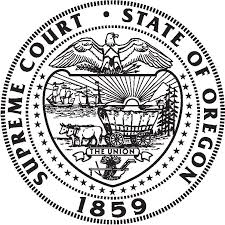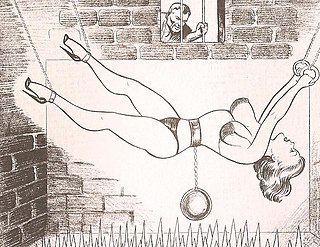Miller v. California, 413 U.S. 15 (1973), was a landmark decision of the US Supreme Court modifying its definition of obscenity from that of "utterly without socially redeeming value" to that which lacks "serious literary, artistic, political, or scientific value". It is now referred to as the three-prong standard or the Miller test.
Reno v. American Civil Liberties Union, 521 U.S. 844 (1997), was a landmark decision of the US Supreme Court unanimously ruling that anti-indecency provisions of the 1996 Communications Decency Act (CDA) violated the First Amendment's guarantee of freedom of speech. Two Justices concurred in part and dissented in part to the decision. This was the first major Supreme Court ruling on the regulation of materials distributed via the Internet.
Roth v. United States, 354 U.S. 476 (1957), along with its companion case Alberts v. California, was a landmark decision of the US Supreme Court which redefined the Constitutional test for determining what constitutes obscene material unprotected by the First Amendment.
Stanley v. Georgia, 394 U.S. 557 (1969), was a United States Supreme Court decision that helped to establish an implied "right to privacy" in U.S. law, in the form of mere possession of obscene materials.
The Hicklin test is a legal test for obscenity established by the English case Regina v. Hicklin (1868). At issue was the statutory interpretation of the word "obscene" in the Obscene Publications Act 1857, which authorized the destruction of obscene books. The court held that all material tending "to deprave and corrupt those whose minds are open to such immoral influences" was obscene, regardless of its artistic or literary merit.
Ashcroft v. American Civil Liberties Union, 535 U.S. 564 (2002), was a United States Supreme Court case involving the American Civil Liberties Union and the United States government regarding the Child Online Protection Act (COPA). The unconstitutionality of the law was ultimately upheld by the United States Court of Appeals for the Third Circuit, while earlier injunctions against the law by that same court were at first dismissed by but later upheld by the Supreme Court. Ashcroft v. Free Speech Coalition (2002) dealt with a similar law, the Child Pornography Prevention Act of 1996 (CPPA).
MANual Enterprises, Inc. v. Day, 370 U.S. 478 (1962), is a decision by the United States Supreme Court which held that magazines consisting largely of photographs of nude or near-nude male models are not obscene within the meaning of 18 U.S.C. § 1461. It was the first case in which the Court engaged in plenary review of a Post Office Department order holding obscene matter "nonmailable."
An obscenity is any utterance or act that strongly offends the prevalent morality of the time. It is derived from the Latin obscēnus, obscaenus, "boding ill; disgusting; indecent", of uncertain etymology. The word can be used to indicate a strong moral repugnance, in expressions such as "obscene profits" or "the obscenity of war". As a legal term, it usually refers to graphic depictions of people engaged in sexual and excretory activity.

Nitke v. Gonzalez, 413 F.Supp.2d 262 was a United States District Court for the Southern District of New York case regarding obscene materials published online. The plaintiff challenged the constitutionality of the obscenity provision of the Communications Decency Act (CDA). She claimed that it was overbroad when applied in the context of the Internet because certain contents deemed lawful in some communities and unlawful in others will be restricted due to the open access of the Internet. The plaintiff also sought a permanent injunction against the enforcement of the obscenity provision of the CDA. The court concluded that insufficient evidence was presented to show there was substantial variation in community standards, as applied in the "Miller test", and to show how much protected speech would actually be impaired because of these differences. The relief sought was denied, and the court ruled for the defendant. The Supreme Court subsequently affirmed this ruling without comment.

State v. Henry was a 1987 decision of the Oregon Supreme Court which held that the Oregon state law that criminalized obscenity was unconstitutional because it violated the free speech provision of the Oregon Constitution. The ruling made Oregon the first to abolish the offense of obscenity in its state law, although obscenity remains a federal offense.
United States v. Thirty-seven Photographs, 402 U.S. 363 (1971), is a United States Supreme Court decision in an in rem case on procedures following the seizure of imported obscene material. A 6–3 court held that the federal statute governing the seizures was not in violation of the First Amendment as long as the government began forfeiture proceedings within 14 days of the seizure.
United States v. 12 200-ft. Reels of Film, 413 U.S. 123 (1973), was an in rem case decided by the United States Supreme Court that considered the question of whether the First Amendment required that citizens be allowed to import obscene material for their personal and private use at home, which was already held to be protected several years earlier. By a 5–4 margin, the Court held that it did not.
Quantity of Books v. Kansas, 378 U.S. 205 (1973), is an in rem United States Supreme Court decision on First Amendment questions relating to the forfeiture of obscene material. By a 7–2 margin, the Court held that a seizure of the books was unconstitutional, since no hearing had been held on whether the books were obscene, and it reversed a Kansas Supreme Court decision that upheld the seizure.
Marcus v. Search Warrant, 367 U.S. 717 (1961), full title Marcus v. Search Warrant of Property at 104 East Tenth Street, Kansas City, Missouri, is an in rem case decided by the United States Supreme Court on the seizure of obscene materials. The Court unanimously overturned a Missouri Supreme Court decision upholding the forfeiture of hundreds of magazines confiscated from a Kansas City wholesaler. It held that both Missouri's procedures for the seizure of allegedly obscene material and the execution of the warrant itself violated the Fourth and Fourteenth amendments' prohibitions on search and seizure without due process. Those violations, in turn, threatened the rights protected by the First Amendment.
Smith v. California, 361 U.S. 147 (1959), was a U.S. Supreme Court case upholding the freedom of the press. The decision deemed unconstitutional a city ordinance that made one in possession of obscene books criminally liable because it did not require proof that one had knowledge of the book’s content, and thus violated the freedom of the press guaranteed in the First Amendment. Smith v. California continued the Supreme Court precedent of ruling that questions of freedom of expression were protected by the Due Process clause of the Fourteenth Amendment from invasion by state action. It also established that in order for one to be criminally liable for possession of obscene material, there must be proof of one’s knowledge of the material.
United States obscenity law deals with the regulation or suppression of what is considered obscenity. In the United States, discussion of obscenity typically relates to pornography, as well as issues of freedom of speech and of the press, otherwise protected by the First Amendment to the Constitution of the United States. Issues of obscenity arise at federal and state levels. The States have a direct interest in public morality and have responsibility in relation to criminal law matters, including the punishment for the production and sale of obscene materials. State laws operate only within the jurisdiction of each state, and there are a wide differences in such laws. The federal government is involved in the issue indirectly, by making it an offense to distribute obscene materials through the post, to broadcast them, as well as in relation to importation of such materials.

Nights of Horror is an American series of fetish comic books, created in 1954 by publisher Malcla, drawn by comic artist Joe Shuster, who is also one of the original creators of Superman. The comic stories were written by an author under the pseudonym Clancy, who also used other pseudonyms for different issues of the books. The stories are based on situations of BDSM, bondage, torture, and sexual slavery, featuring both men and women as the tormentors and victims. The series was important in the conviction of Jack Koslow in 1954, during the trial of the Brooklyn Thrill Killers. The books themselves were seized and banned first by New York City, then by the State of New York for violating obscenity laws, and the case went to the Supreme Court of the United States. The Court determined that the ban was not in violation of First Amendment Rights, and upheld New York's request for destroying copies of Nights of Horror. Shuster was never named as the illustrator until Gerard Jones published the information in 2004.
Heller v. New York, 413 U.S. 483 (1973), was a United States Supreme Court decision which upheld that states could make laws limiting the distribution of obscene material, provided that these laws were consistent with the Miller test for obscene material established by the Supreme Court in Miller v. California, 413 U.S. 15 (1973). Heller was initially convicted for showing a sexually explicit film in the movie theater which he owned, under New York Penal Law § 235.0 which stated that and individual “is guilty of obscenity when, knowing its content and character, he 1. Promotes, or possesses with intent to promote, any obscene material; or 2. Produces, presents or directs an obscene performance or participates in a portion thereof which is obscene or which contributes to its obscenity."
Rabe v. Washington, 405 U.S. 313 (1972), was a decision by the United States Supreme Court involving the application of obscenity laws and criminal procedure to the states. On 29 August 1968, William Rabe, the manager of a drive-in movie theater in Richland, Washington, was arrested on obscenity charges for showing the film Carmen, Baby. Due to First Amendment concerns, the local court convicted Rabe not on the basis that the film as a whole was obscene, but that exhibiting it in a drive-in theater was. The Supreme Court reversed the conviction holding that the citizens of Washington State had no notice under the Sixth Amendment that the place where a film was shown was an element of the offense.
Ginzburg v. United States, 383 U.S. 463 (1966), was a decision by the United States Supreme Court involving the application of the First Amendment to Federal obscenity laws. One of a trio of cases, Ginzburg was part of the Supreme Court's attempt to refine the definitions of obscenity after the landmark 1957 case Roth v. United States.



